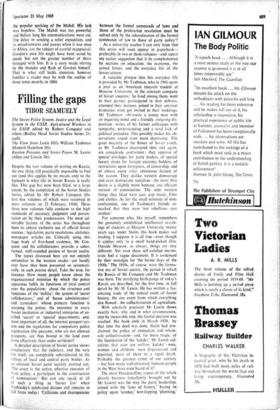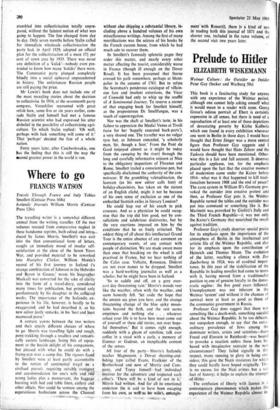Filling the gaps
TIBOR SZAMUELY
The View from Lenin Hills William Taubman (Hamish Hamilton 30s) Russian Peasants and Soviet Power M. Lewin (Allen and Unwin 70s) Despite the vast volume of writing on Russia, the one thing still practically impossible to find out (and this applies by no means only to the layman) is what life in Soviet Russia is really like. This gap has now been filled, to a large extent, by the completion of the Soviet Studies Series, edited by Mr Robert Conquest .(the first five volumes of which were -reviewed- in these columns on 23 February 1968). These three new volumes fully, conform to. the high standards of accuracy,- judgment and presen- tation set by their predecessors. The most ad- mirable feature of the series has throughout been its almost exclusive use of official Soviet sources: legislation, party resolutions, statistics, newspaper articles etc. Critically using this huge body of first-hand evidence, Mr Con- quest and his collaborators provide a sober, factual, well-rounded picture of Soviet reality.
The topics discussed here are not entirely unfamiliar to the western reader—yet hardly ever have they been presented so systemati- cally, in such precise detail. Take the KGB, for instance. How many people know about the organisational minutiae by which the police apparatus fulfils its functions of total control over the population: about the structure and functions of the `militia'; the system of 'secret collaborators,' and of 'house administrators' and 'caretakers' whose primary function is assisting the police; the existence in every Soviet institution or industrial enterprise of so- called 'secret' or 'special' departments; and, most important of all, the internal passport sys- tem and the regulations for compulsory police registration (the peasants, who are not allowed passports, are thus bound to the land even more effectively than under serfdom)?
A detailed description of Soviet justice shows conclusively that the judiciary, and the very law itself, are completely subordinated to the rulings of local and central party bodies. As an eminent Soviet jurist recently pointed out, 'The court is the active, effective executor of State policy, a participant in the construction of communism.' But can one speak at all of such a thing as 'Soviet law' when Vyshinskjr's celebrated dictum still remains in full force today: 'Collisions and discrepancies between the formal commands of laws and those of the proletariap revolution must be
solved only by the subordination of the formal
commands of law to those of party policy'? As a university teacher I can only hope that this series will soon appear in paperback—
preferably in two or three volumes—and repeat my earlier suggestion that it be complemented by sections on education, the economy, the armed forces, and the everyday life of the Soviet citizen.
A valuable glimpse into this everyday life is provided by Mr Taubman, who in 1966 spent -a year as an American research Student at Moscow University. in the constant company of Soviet students: he lived among them, went to their parties, participated in their debates, attended their lectures, joined in their amateur dramatics, even got invited to their weddings. Mr Taubman—obviously a young man with an inquiring mind and a friendly, outgoing dis- position—writes of his former colleagues with sympathy, understanding and a total lack of political prejudice. This possibly makes his ob- servations sound even more depressing. The great majority of the flower of Soviet youth, as Mr Taubman discovered time and again, are completely conformist: they approve of special privileges for party leaders, of special luxury shops for foreign currency holders, of restrictions upon foreigners, of censorship, and of •almost every other obnoxious feature of the system. They dislike western democracy and even democratic socialism—the most they desire is a slightly more humane and efficient version of communism. The only western things they liked were jazz, pop music, films and clothes. As for the small minority of non- conformists, one of Taubman's friends re- marked that they were 'not rebellious—just restless.'
For someone who, like myself, remembers the genuinely uninhibited intellectual search- ings of students at Moscow University twenty years ago, under Stalin, this book makes sad reading. I suppose it is all true—even though it applies only to a small hand-picked elite. Outside Moscow, as always, things are very different. Yet even these self-satisfied merito- crats feel a vague discontent. It is evidenced by their nostalgia for 'the heroic days of the 1930s.' The 1930s, of course, were the forma- tive era of Soviet society, the period in which the Russia of Mr Conquest and Mr Taubman was born. The terrifying birth-pangs of today's Russia are described, for the first time, in full detail by Mr M. Lewin. He has written a fas- cinating study of the central event of Soviet history, the one event from which everything else flowed: the collectivisation of agriculture.
With scholarly precision Mr Lewin shows exactly how, why and in what circumstances, step by inexorable step, the fateful decision was reached. His book ends in March 1930: by that time the deed was done. Stalin had pro- claimed the policy of immediate and whole- sale- collectivisation—and, far more tragic, of the liquidation of the 'kulaks.' Mr Lewin cal- culates that over ten million 'kulaks'—men, women and children—were dispossessed and deported, most of them to a rapid death. Probably the greatest crime of our century —but how many well-informed, humane people in the West have even heard of it?
The most bloodcurdling aspect of the whole ghastly business (excellently brought out by Mr Lewin) was the way the party leadership, armed with the 'laws of history,' basing its policy upon 'science,' worshipping 'planning,' stumbled into collectivisation totally unpre- pared, without the faintest notion of what was going to happen. The line changed from day to day. Only seven months before Stalin called for immediate wholesale collectivisation the party had, in April 1929, adopted an official plan for the collectivisation of a mere 171 per cent of sown area by 1933. There was never any definition of a lulak'—nobody even pre- tended to know how many 'kulaks' there were. The Communist party plunged completely blindly into a social upheaval unprecedented in history. The unfortunate Russian people are still paying the price.
Mr Lewin's book does not include one of the most revealing stories about the decision to collectivise. In 1934, at the seventeenth party congress, Voroshilov recounted with great relish how, some five or six years earlier, com- rade Stalin and himself had met a famous Russian scientist who had expressed his utter disbelief in the possibility of collectivising agri- culture. To which Stalin replied : 'Oh well, perhaps with luck something will come of it.' That 'perhaps' decided the fate of a whole nation.
Forty years later, after Czechoslovakia, one has the feeling that this is still the way the second greatest power in the world is run.







































 Previous page
Previous page